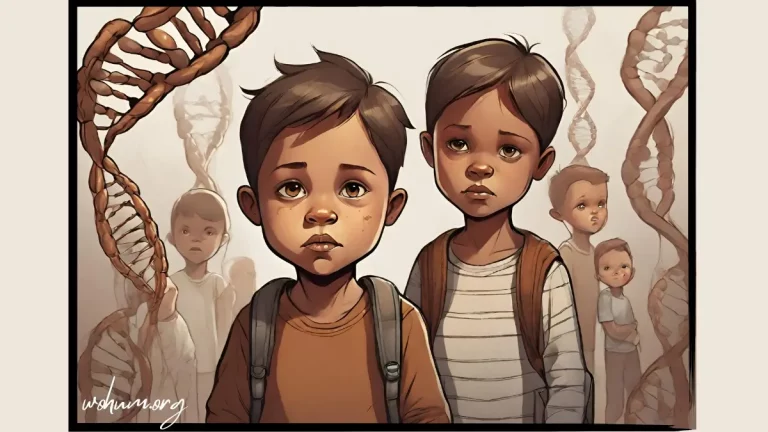Nature vs. Nurture in Child Development: Examining the Roles of Genetics and Environment


When it comes to child development, there has long been a debate about whether nature or nurture plays a more significant role. Nature refers to the genetic and biological factors that contribute to a child’s development, while nurture refers to the environmental factors that shape a child’s experiences and behaviors.
Nature vs. nurture shapes child development. Genetics (nature) influences traits like eye color and personality. Environment (nurture) impacts behavior, cognitive growth, and parenting styles. Both factors interact intricately to define a child’s journey.
This article will explore more about the nature vs. nurture debate in child development and delve deeper into the role each factor plays.

The nature vs. nurture debate has been a topic of discussion for decades, and while both factors play a role in child development, experts have long debated which one has a more significant impact. Some argue that nature plays a more critical role because genes determine physical traits, personality, and intelligence. Others argue that nurture plays a more significant role because the environment in which a child grows up can influence their behavior and personality.
Epigenetics is like nature and nurture shaking hands. It’s about how our environment talks to our genes. Even if two people have the same genes, like identical twins, epigenetics can make them different in small ways.
Think of our genes as a book. Epigenetics doesn’t rewrite the book; it just adds notes in the margins. These notes come from our experiences, like diet or stress. So, while we can’t change our genes, our surroundings can influence how they work.
Parents, here’s the good news: you have some influence. A loving, positive environment can help guide how your child’s genes express themselves.

Research has shown that genetics play a significant role in intelligence, with studies finding that intelligence is 50-80% heritable.
While nurture plays an important role in shaping a child’s development, nature also has a significant impact. Genes play a role in determining a child’s physical characteristics, such as eye color, height, and bone structure. They also influence a child’s personality traits, such as introversion or extroversion, and can affect their cognitive development.
Additionally, some genetic disorders can impact a child’s development, such as Down syndrome or autism spectrum disorder.
Nurture also plays an essential role in shaping a child’s development. The environment in which a child grows up can influence their behavior, personality, and cognitive development. For example, studies have shown that children who grow up in poverty are more likely to experience developmental delays and have lower cognitive abilities than children who grow up in more affluent environments.
Parenting styles also play a significant role in shaping a child’s development. Authoritarian parenting, for example, has been linked to lower self-esteem and a higher likelihood of behavioral problems. In contrast, authoritative parenting has been linked to better academic achievement and higher self-esteem.
| Aspect | Description | Examples |
|---|---|---|
| Nature: Genetic and Hereditary Influences | Traits and behaviors primarily determined by genes. | - Babies' sleeping patterns are mostly genetic. - 60% of a baby's temperament is genetic. - Preferences for certain foods. - Activity level (active or sedentary). |
| Nurture: Environmental Influences | Traits and behaviors influenced by experiences and environment. | - Sunlight exposure can improve poor sleep patterns. - Bedtime routines can induce better sleep. - Swaddling, rocking, and swaying can soothe a crying baby. |
Reference: Maryville University
Have you ever wondered why your kids, raised in the same home, can be so different? Let’s dive into the world of siblings and twins to understand this better.
While nature and nurture are often pitted against each other, they interact in complex ways to shape a child’s development. Genes can influence how a child responds to their environment, and the environment can affect how genes are expressed.
For example, research has shown that the quality of the caregiving a child receives can impact how certain genes are expressed. Children who receive high-quality caregiving, such as responsive and nurturing parenting, are more likely to have better cognitive and socio-emotional outcomes than children who receive low-quality caregiving.
| Aspect | Nature (Genetics) | Nurture (Environment) |
|---|---|---|
| Brain Development | Brain's basic structure at birth. | Early experiences shape neural connections. |
| Genetic predispositions. | Quality of care and stimulation affects brain growth. | |
| Learning Phases | Inborn ability to learn languages. | Exposure to multiple languages can enhance bilingualism. |
| Emotional Growth | Genetic temperament (e.g., easy-going). | Caregiver's responsiveness shapes emotional security. |
| Inherited mood tendencies. | Positive/negative experiences influence emotional well-being. | |
| Sensory Learning | Natural sensory sensitivities. | Exposure to varied sensory experiences enhances learning. |
| Physical Growth | Genetic height and build. | Nutrition, physical activity, and healthcare influence physical development. |
| Challenges | Genetic vulnerabilities (e.g., ADHD, ASD). | Environmental factors like stress, lack of care, or trauma can impact development. |
| Social Skills | Inborn social tendencies. | Interactions with caregivers and peers shape social skills. |
When it comes to nurturing your child’s development, interventions can play a crucial role. Firstly, being aware of any genetic predispositions your child might have is beneficial, as it helps understand their natural tendencies better. Secondly, taking advantage of programs and guidance available, such as early childhood education, can be an excellent support for parents. These resources are designed to assist you in fostering the best possible environment for your child’s optimal development, complementing their natural traits and helping them flourish.
“Nature sets the stage; nurture writes the script.”
-World Humanitarian Movement – WOHM
In conclusion, the nature vs. nurture debate in child development is complex, with both factors playing a significant role in shaping a child’s development. While genetics play a role in determining physical traits and personality, the environment in which a child grows up can influence their behavior, personality, and cognitive development. Understanding the interaction between nature and nurture is essential to promoting healthy child development.
Nature, which refers to genetic factors, provides the inborn ability for children to learn languages and has natural sensory sensitivities. Nurture, on the other hand, emphasizes the importance of environmental factors. For instance, exposure to multiple languages can enhance bilingualism, and varied sensory experiences can boost sensory learning.
Nature plays a pivotal role in cognitive growth. For example, the brain’s basic structure is determined at birth, and there are genetic predispositions that influence cognitive development. Research has also shown that intelligence is 50-80% heritable.
Both nature and nurture have significant impacts on child development. While genetics determine physical traits and aspects of personality, the environment in which a child grows can influence their behavior, personality, and cognitive development.
While nurture can significantly influence a child’s development, it cannot entirely override genetic factors. However, a positive environment can guide how a child’s genes express themselves.
Absolutely. Parents have a considerable influence on their child’s development. A loving, positive environment can help guide how your child’s genes express themselves. Being aware of any genetic predispositions and taking advantage of available resources can assist parents in fostering the best environment for their child’s growth.
Personality is influenced by both nature and nurture. Genes play a role in determining personality traits, such as introversion or extroversion. However, the environment, including parenting styles and experiences, can also shape personality.
Autism has genetic roots, but the environment can also influence its manifestation. While genetics can predispose someone to autism, environmental factors can either amplify or mitigate its effects.
Nature and nurture are not mutually exclusive; they interact in complex ways to shape a child’s development. For instance, genes can influence how a child responds to their environment, and vice versa. Epigenetics is a prime example of this interaction, where the environment communicates with our genes, influencing how they work without changing the genetic code itself.
The most crucial aspect of nurture in shaping a child’s development is the parenting styles that parents adopt, coupled with the quality of early childhood education they receive.
Down syndrome is primarily a result of nature. It arises from a genetic anomaly with an extra chromosome 21. While nurture (environmental) factors might influence the health and development of someone with Down syndrome, the condition is rooted in genetics.
References

Nefise is a rewarded content creator and honored master degree clinical psychologist, specializing in CBT and EMDR therapy. She is renowned for her work with children affected by natural disasters and autism.
Comment (1)
Urmi Makwana
Very detailed and very informative thread.
Explained with great clarity. Appreciated with great insight.